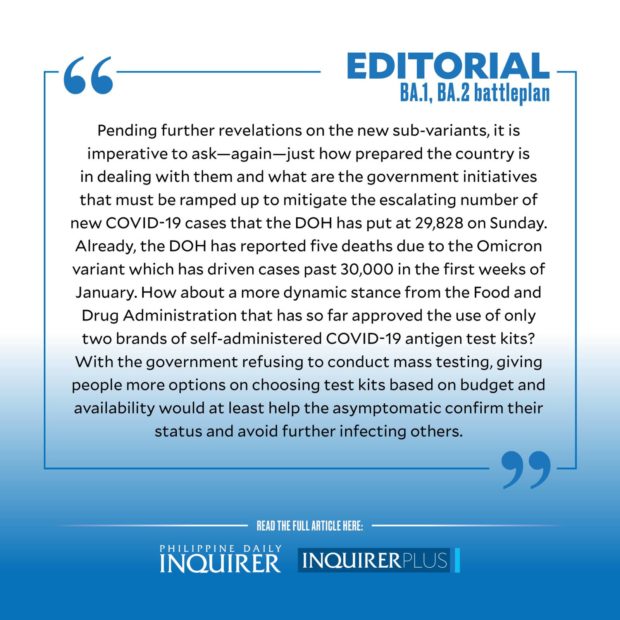BA.1, BA.2 battle plan
Just when you think that news about COVID-19 couldn’t get any worse as cases continue to soar outside the National Capital Region, comes the Department of Health’s (DOH) alarming announcement that two sub-lineages of the highly transmissible Omicron variant have been detected, the BA.1 and BA.2.
In a media briefing Tuesday, DOH Undersecretary Maria Rosario Vergeire also said BA.2 is now “predominant in most regions” in the country, and is found in 98.9 percent of all sequenced samples, compared to a mere 1.3 percent in November. Citing analysis from the Philippine Genome Center, Vergeire said the original Omicron lineage called BA.1 has been detected in eight regions, and is predominant in the Bicol Region and among returning overseas Filipinos.
Article continues after this advertisementBA.1 and BA.2 mutations have been categorized as VUI or “variant under investigation, not yet a variant of concern,” Health Secretary Francisco Duque III said, adding that the department’s Epidemiology Bureau has been coordinating with representatives of the World Health Organization for the latest data on the variants and how they might affect the number and severity of virus cases in the country. While BA.2 is more transmissible than Omicron based on limited data, the health official said that COVID-19 vaccines remain effective in preventing severe and critical cases, and even deaths. Also known as stealth Omicron, BA.2 has so far been detected in at least 49 countries, including the United States, the United Kingdom, India, Denmark, and Sweden.
Pending further revelations on the new sub-variants, it is imperative to ask—again—just how prepared the country is in dealing with them and what are the government initiatives that must be ramped up to mitigate the escalating number of new COVID-19 cases that the DOH has put at 29,828 on Sunday. Already, the DOH has reported five deaths due to the Omicron variant which has driven cases past 30,000 in the first weeks of January.
How about a more dynamic stance from the Food and Drug Administration that has so far approved the use of only two brands of self-administered COVID-19 antigen test kits? The regulatory agency said that 31 other applications for special certification have been turned over to the Research Institute for Tropical Medicine for evaluation. With the government refusing to conduct mass testing, giving people more options on choosing test kits based on budget and availability would at least help the asymptomatic confirm their status and avoid further infecting others. The national government was correct to prod PhilHealth to include RT-PCR testing in its COVID-19 coverage for individuals isolating at home and this must be fully implemented. The DOH must double-time on its much-delayed distribution of home care or “Kalinga Kits’’ for people with mild cases who are isolating at home.
Article continues after this advertisementWith the decision of the controversial Procurement Service of the Department of Budget and Management to stop buying pandemic supplies following its alleged involvement in corruption over the awarding of pandemic contracts, the government must clarify which agency or agencies are now doing the procurement for these supplies that frontline government workers need to protect themselves. Apparently responding to this concerning gap, the Civil Service Commission (CSC) said that government agencies can use their budget to conduct COVID-19 testing and provide pandemic home care kits to their sick personnel. CSC Commissioner Aileen Lizada urged the heads of agencies to take care of their workers, citing a DBM circular allowing them to use their maintenance and other operating expenses for health protocols. Giving government workers the tools to manage their illness at home would prevent congestion in health centers and lessen their stress and worries, Lizada said.
Certainly, the government’s efforts will benefit from the presence of more scientists and doctors in the anti-COVID task force, who are bound to focus more on the science, medical protocols, and treatment of virus cases instead of taking a more punitive approach to the problem. We can certainly use less scare tactics and a more informative and empathetic stance to convince people to get vaccinated and address vaccine hesitancy.
Finally, the government should focus more on the pandemic response and less on politics. With the election fever kicking in and more people moving about for the campaign, the risk of surges in infections from the new variants is getting bigger. What the public needs from the national government now is not political noise like President Duterte’s recent threat to name the “most corrupt” presidential candidate but a more coherent pandemic response if we are to survive this constantly evolving, dangerously unpredictable virus.
For more news about the novel coronavirus click here.
What you need to know about Coronavirus.
For more information on COVID-19, call the DOH Hotline: (02) 86517800 local 1149/1150.
The Inquirer Foundation supports our healthcare frontliners and is still accepting cash donations to be deposited at Banco de Oro (BDO) current account #007960018860 or donate through PayMaya using this link.

















